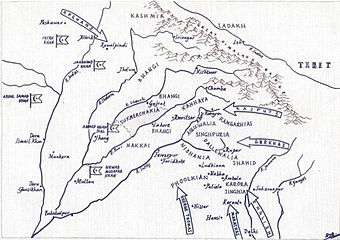Shaheedan Misl

|
Sikh Confederacy (1707-1799) |
|
Phulkian Misl ·
Ahluwalia Misl ·
Bhangi Misl ·
Kanheya Misl ·
Ramgarhia Misl ·
Singhpuria Misl ·
Panjgarhia Misl ·
Nishanwalia Misl ·
Sukerchakia Misl ·
Dallewalia Misl ·
Nakai Misl ·
Shaheedan Misl
|
The Shaheedan Misl, was one of twelve Sikh Misls that later became the Sikh Empire. It held a small amount of territory in the Malwa (Punjab) area around the Damdama Sahib [1] before being incorporated into the Sikh Empire of the Sukerchakia Misl by Ranjit Singh.
Origins and history
In 1748, Baba Deep Singh was appointed the leader of the Shaheedan Misl and the Mahant of the Takht Sri Damdama Sahib. In 1757, Ahmad Shah Abdali invaded India [2] and sent an army to the Harmindar Sahib to block Sikhs from entering the Gurdwara. Baba Deep Singh and a company of men who rode with him to free the gurdwara were killed in the Battle of Gohalwar (1757) against the Durrani Army. His successor, Suddha Singh, later led the misl into a skirmish against the Afghan government of Jalandhar City The first two leaders of the misl were considered Shaheeds, or martyrs, by their contemporaries so the misl became known as, Shaheedan, or the followers of the martyrs.[3] Karm Singh, the next leader of the misl, expanded the territory of the misl by annexing several nearby towns to his control.[4] The misl was annexed by the Sikh Empire at some point in the early 19th century and became a part of the Sikh Empire. The Nihang order of Sikhs maintains the traditions of this misl.[1]
Present day roots can be traced to the descendants of Sirdar Bahadur General Gulab Singh of the Shaheedan Misl and Sikh Army.
References
- 1 2 McLeod, W.H. (2005). Historical dictionary of Sikhism. The Scarecrow Press. p. 186. ISBN 978-0-8108-5088-0.
- ↑ Hoernle, August Friedrich Rudolf; Herbert Alick Stark (1906). A history of India. Orissa Mission Press. p. 113.
- ↑ Calcutta review, Volume 77. Calcutta: University of Calcutta, University of Calcutta. Dept. of English. p. 159.
- ↑ Griffin, Lepel Henry (1870). The Rajas Of The Punjab: Being The History Of The Principal States In The Punjab And Their Political Relations With The British Government (1870). Lahore: Punjab Printing Company, Limited. pp. 46–47. ISBN 978-1-104-32452-0.
| ||||||||||||||||||||||||||||||||||